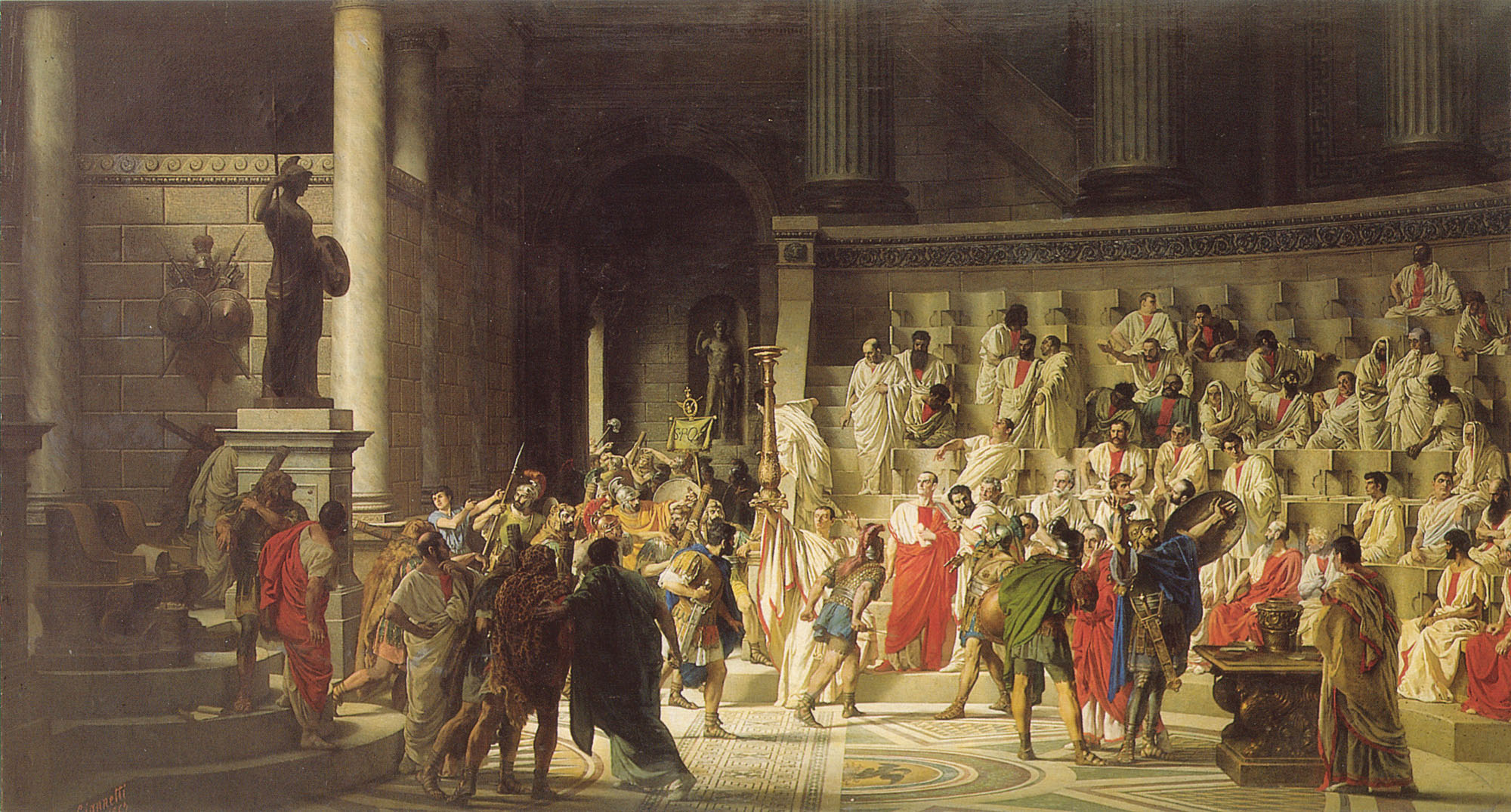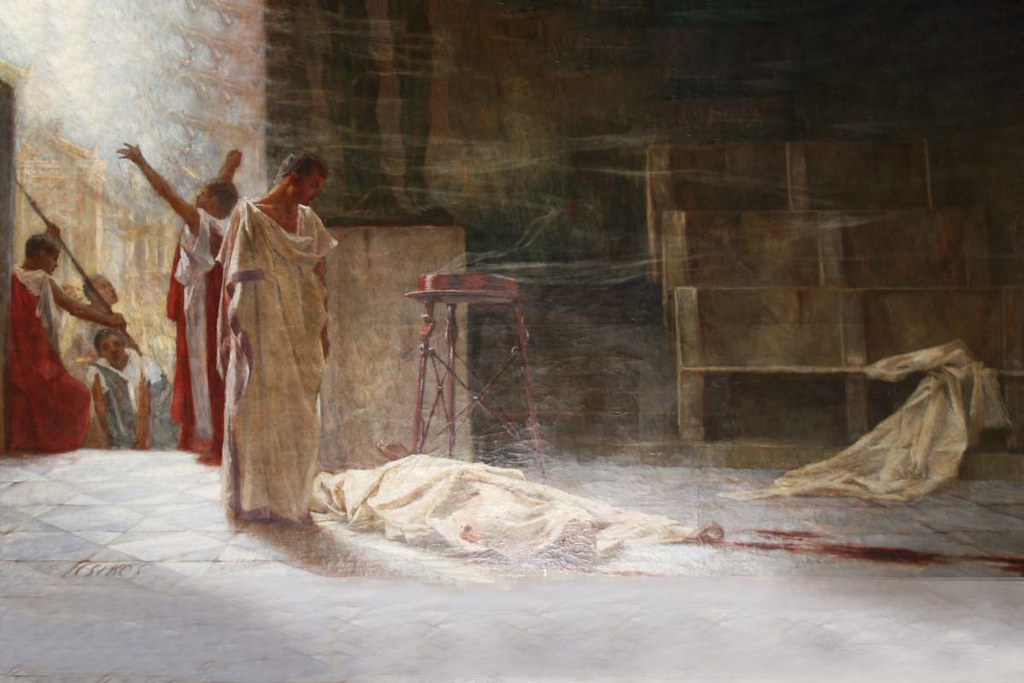Caesar’s Death
The leaders of the conspiracy against Caesar were former Pompey’s soldiers Marcus Junius Brutus and Gaius Cassius Longinus, and they were joined by Caesar’s men led by Decimus Junius Brutus. This conspirator group did not have a complete strategy for how to run the state; their only plan was to kill Gaius Julius Caesar, as they considered it their duty to remove anyone who wanted to introduce royal power in Rome.
It was decided that the dictator’s assassination would be carried out on March 15, 44 BC. Although some believed that Mark Antony should be killed with Caesar, it was decided not to do so so as not to be thought that the conspirators were resolving their own personal disputes rather than saving the Roman state. Caesar seems to have been prepared for the possibility of an assassination, but despite this, he refused to surround himself with Hispanic cohorts for personal protection. At a dinner with Lepidus, he claimed that a sudden death was better than a life of fear.

There are various legends about omens that foretold Caesar’s assassination, such as that when he was going to the Senate, a man handed him a letter with details of the conspiracy that he did not have time to read. Caesar was otherwise ill that day and wanted to postpone the Senate session, but Decimus Brutus persuaded him to explain the postponement in person so as not to offend the Senate. The Senate met in Pompey’s Theater on March 15, 44 BC.
When Caesar tried to make a speech, the conspirators rushed him from all sides so that each of them could hit him at least once. They wanted everyone to share the blame, and in the process, many injured each other. There were 23 blows in total. Caesar’s personal physician Antinissi claimed that of all the wounds, only the one on the chest was fatal. Thus, Gaius Julius Caesar ended his life in the Senate, against which he had fought for a good part of his life and whose power he had destroyed forever.

In the first days after Caesar’s death, the position of the consuls Mark Antony and Lepidus, who were Caesar’s closest associates, was not strong. In this situation, a session of the Senate was held where the proposal to declare Caesar a tyrant and to express gratitude to his murderers was rejected, and Cicero’s proposal to recognize all of Caesar’s laws as valid and to leave his murderers unpunished was accepted. None of the murderers lived longer than three years after Caesar’s death, and the republic did not manage to recover from Caesar’s blows and soon officially became an empire.
Summary
Gaius Julius Caesar entered politics as a member of the defeated party who opposed the dictator and survived. He was a man who tried in every way to gain popularity among the people. Although late, he gradually advanced through the hierarchy of Roman magistracies. At the right moment, he placed himself under the protection of those stronger than himself in order to advance to their level.
Although he was only slightly younger than his fellow triumvirs, he was the one who rose as their time passed. During the triumvirate, he became a rich and very famous military leader who knew exactly what he wanted at all times. He was probably the only one who knew it. Each of his moves led to the gradual strengthening of his own position, while Pompey was increasingly weakened.
The Treaty of Lucca confirmed Caesar’s equality with the other triumvirs, but his army was closest to Rome. Crossing the Rubicon was a calculated and courageous move that led to the expulsion of his opponents from Italy. The gradual destruction of opponents one by one before the decisive battle turned out to be a smart move, as it led to discussions among the opposing command who felt nostalgia for Rome.
Caesar, with his intelligence and calculation, came to the point that after the civil war, he became the most powerful individual in the Roman Republic. Although he spent most of his time in the provinces, Caesar knew that from there he could influence the policy of the Senate in Rome. As a perpetual dictator, he enjoyed almost unlimited honors and powers that differed only in name from those of a monarch, but the very words monarchy and king were avoided. Caesar still considered himself the first man of the republic, so he stopped relying on his army and returned to political life in Rome. This cost him his life, as he was removed illegitimately.
Caesar’s death could not change the social order. The Senate was no longer the same institution from the earlier period of the republic. After a short chaotic period, a second triumvirate was established between Lepidus, Mark Antony, and Octavian. History repeated itself with a civil war between Mark Antony and Octavian. Octavian abolished the republic and became the first Roman emperor seventeen years after Caesar’s death. The power of the aristocracy was still sufficient to remove the person who represented the power, but not to restore the old system, and Octavian took Caesar’s place.

The era of both triumvirates represents a transitional period between the republic and the establishment of the monarchy. The monarchy itself, especially during the Principate, retained a large number of the republic’s institutions. Caesar’s dictatorship represented the first attempt at a monarchical way of governing the Roman state. Caesar can be called the last consul of the republic and the first ruler of the monarchy.
Caesar’s name is now considered synonymous with the collapse of the Roman Republic, although he did not directly end it. He greatly undermined the stability of the Senate and other institutions of the republic, so that it was much easier for his successors to abolish the institution of the republic. Caesar’s ambition and the attempt of his opponents to suppress it created an empire based on the army, which survived as such until 476.
Sources and Literature:
Beard, M. (2015). SPQR: A History of Ancient Rome.
Plutarch. (1859). Plutarch’s Lives: translated from the original Greek, with notes, critical and historical, and life of Plutarch. New York: Derby & Jackson,
Suetonius, approximately 69-approximately 122. (1883). The lives of the twelve Caesars. New York: R. Worthington.
Hello, my name is Vladimir, and I am a part of the Roman-empire writing team.
I am a historian, and history is an integral part of my life.
To be honest, while I was in school, I didn’t like history so how did I end up studying it? Well, for that, I have to thank history-based strategy PC games. Thank you so much, Europa Universalis IV, and thank you, Medieval Total War.
Since games made me fall in love with history, I completed bachelor studies at Filozofski Fakultet Niš, a part of the University of Niš. My bachelor’s thesis was about Julis Caesar. Soon, I completed my master’s studies at the same university.
For years now, I have been working as a teacher in a local elementary school, but my passion for writing isn’t fulfilled, so I decided to pursue that ambition online. There were a few gigs, but most of them were not history-related.
Then I stumbled upon roman-empire.com, and now I am a part of something bigger. No, I am not a part of the ancient Roman Empire but of a creative writing team where I have the freedom to write about whatever I want. Yes, even about Star Wars. Stay tuned for that.
Anyway, I am better at writing about Rome than writing about me. But if you would like to contact me for any reason, you can do it at contact@roman-empire.net. Except for negative reviews, of course. 😀
Kind regards,
Vladimir
